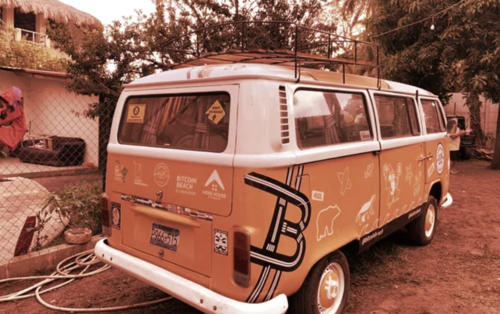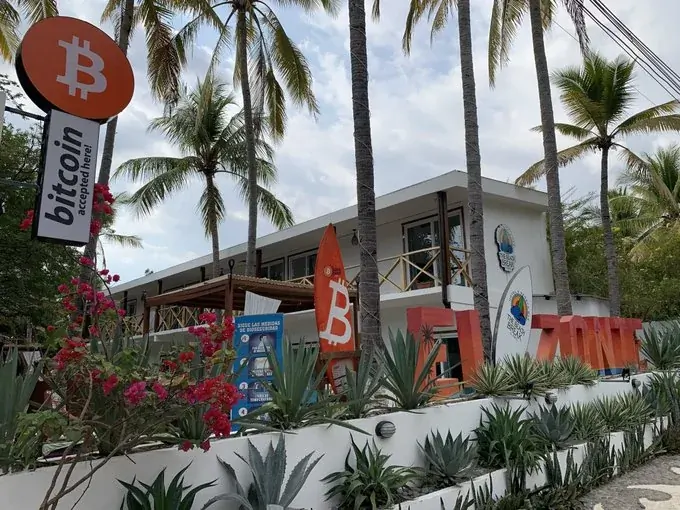

About the author
Alex Kantrowitz is the founder of Big Technology, a newsletter and podcast about big tech and society. He is the author of the book "Always Day One: How The Tech Titans Plan To Stay On Top Forever," and a former senior reporter at BuzzFeed.
Editor's note: This piece first ran in Alex Kantrowitz's newsletter Big Technology.
Right after I hopped out the back of a pickup in El Zonte, El Salvador, I recognized I wasn’t in an ordinary beach town.
El Zonte’s welcome sign had two Bitcoin logos, its cafes offered 75% discounts if you pay in Bitcoin, and its trash cans sported the Bitcoin emblem. I’d been hitchhiking my way through the country’s west coast, enjoying its world-class surf conditions last month, and wasn’t looking for its Bitcoin epicenter. But somehow, I’d stumbled right into it.
When El Salvador made Bitcoin legal tender last September, many — myself included — reacted skeptically. Nayib Bukele, El Salvador’s president, seemed to be YOLOing away the country’s treasury like a Reddit-addicted crypto trader.
Bukele has repeatedly bought millions of dollars worth of Bitcoin, complains when he “missed the f***ing bottom by 7 minutes,” and as Bitcoin’s price has tanked in 2022, it has appeared to cost his country dearly. It looks to many like a mess.
But the reality on the ground, I found, is more complicated than the narrative. There’s a good chance El Salvador’s Bitcoin experiment will work out, at least in some ways.
The Bitcoin movement in El Salvador began in El Zonte when a California surfer named Mike Peterson received an anonymous $100,000 Bitcoin donation for the town’s residents. Peterson had been doing community work in El Zonte for years and accepted the money with a mandate to get it in people’s hands. “We formulated a plan to start injecting Bitcoin into the community,” he told me. “And it kind of just exploded from there.”
Bitcoin took off in El Zonte for a reason: it was useful to people. The first, most immediate benefit was it helped Salvadorans avoid exploitative remittance fees they paid on the $6 billion that friends and family outside the country sent back each year. Less apparent, but perhaps more important, was that 70% of the people in El Salvador were unbanked, and a digital wallet would help them start investing. “The Salvadoran people don’t have bank accounts — now they do,” said Roman Martinez, who works with Peterson in El Zonte. “People are buying an asset for the first time.”
After Bukele took office in June 2019, he caught wind of what was taking place in El Zonte, and moved to make Bitcoin legal tender, compelling the country’s merchants to accept it as payment for their goods and services. The law passed in June, then went into effect last fall, turning El Salvador into the first country where Bitcoin is an official currency (the U.S. Dollar still works there too) and setting off the world’s largest national Bitcoin experiment.
El Zonte, where it all began, has turned into a quasi-Mecca for Bitcoiners worldwide.
Today, just five months after becoming legal tender, Bitcoin is everywhere in El Salvador. You can use it at McDonald's, fancy coffee shops, or small groceries run from people’s living rooms that have QR codes hanging out front to enable Bitcoin transactions. El Salvador also has its own wallet, Chivo (meaning “cool”), and it gives anyone who downloads it $30. There have been some hiccups with Chivo’s technology, but 2.1 million Salvadorans, or a third of the country, have used it. As Martinez put it, many are holding an investment asset for the first time.

El Zonte, El Salvador. (Photo: Alex Kantrowitz)
For Bitcoin’s true believers, there’s a ton riding on the El Salvador experiment. If Bitcoin is to reach its full potential, it must be both a store of value and something people use to transact. And El Salvador is its crucial proving ground.
Bitcoin enthusiasts have thus descended on the country (Bitcoiners on El Zonte’s streets asked me if I’d spotted the influencer Max Kaiser, made famous for shrieking onstage in Miami last June, "We're not selling! Fuck Elon!") and their enthusiasm has mixed benefits. They’re investing in the country, with some spending 3 BTC (about $120,000 at current prices) locally to qualify for Bukele's offer of permanent residency. But their exuberance could drive the controversial leader into risky decisions, such as the opening of a largely tax-free “Bitcoin city” and the issuing of $1 billion “volcano bonds."
Bitcoin volatility, of course, will impact everyday Salvadorans who decide to invest in Bitcoin. But in today’s economy, people build wealth by taking risks. And if people living in the U.S., Europe, and the like have that ability, so should Salvadorans.
El Salvador’s Bitcoin experiment could implode, but there’s a chance it succeeds and builds wealth for locals—and that makes it worth trying.
